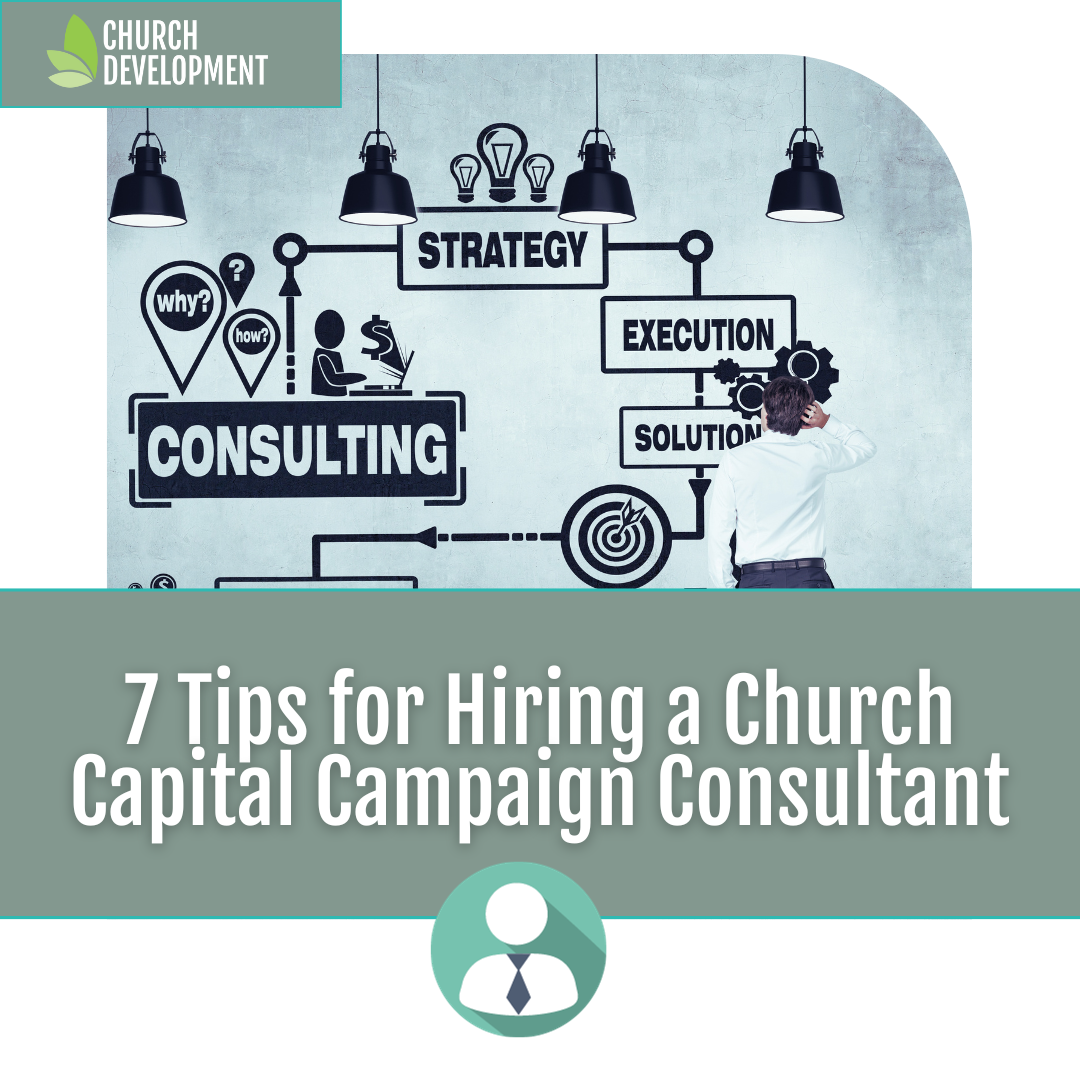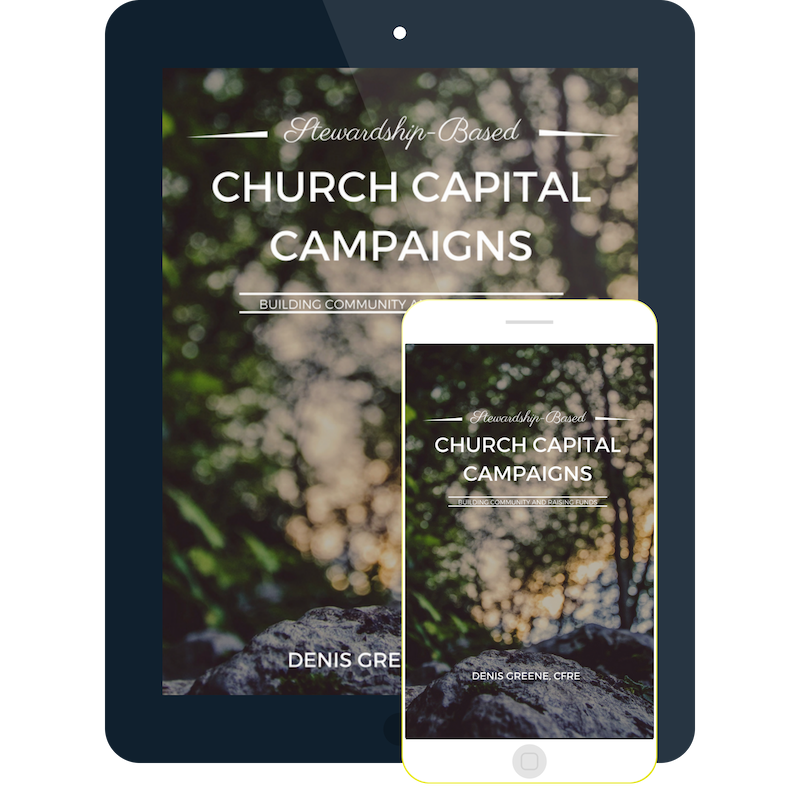Churches that hire a capital campaign consultant are much more likely to achieve success than those who manage their own campaign. We’re not just saying that because we do capital campaigns. Almost every denomination leader and Diocesan stewardship director agrees with us – some even require it.
Without the professional help of experts, church leaders risk missing vital steps in the process. Churches that are new to capital campaigns or have had negative past campaign experiences are especially advised to enlist the help of a consultant. A seasoned consultant can help a church raise substantially more money than would be possible otherwise. This makes your consultant arguably your best campaign purchase when considering ROI, the return on your investment.
The “DIY” Capital Campaign Option
A question commonly asked in churches considering a campaign is, “Couldn’t we do this ourselves and use the saved money toward the campaign goal?”
With a few hours of reading online, you can learn just about everything there is to know about how to plan and implement a capital campaign in your parish. Having these resources at your fingertips gives you the option to manage the campaign without the help of an outside consultant. This is a decision that needs serious consideration.
Many churches have indeed run successful capital campaigns using in-house management. It is also true that many more churches have attempted to do their own campaigns and failed. Churches face numerous potential hazards when they take on a campaign without help.
RISKS FOR CHURCHES GOING IT ALONE
1. Failing to Hire a Campaign Manager
Someone must be the campaign’s manager. Campaign management requires that someone devote a tremendous amount of time to the campaign details—from 200 hours in a small church up to 600 hours in a very large church—during a three to six-month period of time.
Many churches conducting campaigns on their own will simply assign this job to the pastor, and there is no better way than this to drive your pastor to a “sabbatical” at your local hospital.
Many a church capital campaign has completely depleted a pastor’s physical, emotional, and spiritual energy when handled this way.
The campaign manager can be one of several people. It might be someone in the church that you hire for the duration of the campaign, or it might be your church administrator if this person’s plate is not already overflowing. Whoever you choose should have great communication skills and be highly organized.
Capital campaign firms offer a variety of services, from consulting to actual campaign management. The size of your church and the amount you wish to raise will help you determine the amount of professional assistance you need.
In virtually all cases, having a highly specialized consultant/manager in your corner provides for the best possible set of circumstances for your campaign.
2. Not Involving Everyone
We emphasize a community-building and prayer-based approach to planning and managing a church capital campaign. Involving everyone in the plan begins ever before the feasibility study and continues throughout every point during the active phase of the campaign. There are many steps in this process, and it’s easy to miss critical ones.
A high degree of member involvement not only builds community and ownership of the process, it also prepares individuals to make a financial commitment to the campaign. Churches that skip over steps along the way undercut the complex decision-making process that each individual must go through to discern God’s will and make an informed commitment to the project.
3. Inadequate Calendar Management
Timing is everything during the active phase of the campaign. Most church capital campaigns (including the feasibility study) are approximately five months long. These five months contain an inordinate number of decisions that must be made at the right time to keep the campaign on its tight timeline.
There are volunteers to recruit, newsletters to send out, logos and slogans to be decided, goals to determine, people to be asked for gifts—the list goes on and on—and each of these tasks must happen at strategic points during the campaign. Each team will be waiting for key decisions to be made by other teams to move ahead with their planning.
A church that is running its own campaign must face the dreaded learning curve related to calendaring, and will likely make costly mistakes that will affect the campaign’s bottom line.
4. Insufficient Communication
Communication is essential for the whole congregation during the campaign.
The congregation must be aware of the details of the capital project, but members must also be aware of the decisions made by the teams and the questions other members are asking at the events. This is accomplished only through a steady stream of communication using a variety of media: newsletters, bulletin announcements, information from the pulpit, letters, the campaign brochure, email, and campaign video.
Cutting corners on any of these media deprives members of critical information they need to make a giving decision.
Churches challenged by the campaign management learning curve will be tempted to cut back on communication when faced with an overwhelming set of deadlines.
As described above, good communication is what keeps the campaign calendar on track. A major challenge of any campaign is to make sure that everyone involved in a leadership capacity is aware of campaign developments as they occur—they need this information to complete their tasks.
When several teams are simultaneously making decisions that affect each others’ work, communication among the leadership is key. Lack of communication at any point can cause the campaign to either grind to a halt or go in unexpected
directions.
BENEFITS OF HIRING A CONSULTANT
Here are some reasons to hire a qualified consultant to lead you through the capital campaign process in your parish.
- A church typically raises more funds when using an experienced consultant. Results vary, but compared to self-managed campaigns, professionally managed campaigns normally raise 50% to 600% more in gifts and commitments.
- The decision to make a commitment is a complex one. Often, volunteers and nonprofessionals leave out critical steps in leading donors (especially major donors who might give 80-90% of the funds) through the decision to make a significant commitment. A professional attends to every detail in the process.
- A good consultant develops a comprehensive step-by-step fundraising plan based on other successful church campaigns.
- In a professionally managed campaign, the responsibility for making sure the process flows according to plan is assumed by a single paid entity.
- Hiring a consultant to manage campaign details means there will be less of a chance of pastor and volunteer leadership “burnout.”
- An experienced consultant can spot potential problems and address them before they become roadblocks.
- Experts make our daily lives simpler and safer. Professionals from plumbers to dentists apply their specialized knowledge to specific challenges in order to improve the quality of our lives, and save us a good deal of time. It will take an expert much less time to accomplish any given task than a person who has completed a task only once or twice.
- If conflicts arise, the professional can absorb the brunt of any negative emotions and preserve the positive flow of energy in the campaign.
- Investing money up front in professional advice seems to start the flow of funds back to the church, much like priming a pump. Like a chemical catalyst, a professional fundraising consultant acts as a behind-the-scenes servant/leader to bring together everyone’s commitment to the church vision.
- If a consultant can make a ten percent difference in a campaign, he or she will have more than paid for the services rendered. If you choose the right consultant, the impact to your campaign’s bottom line will be far greater than ten percent.
If you’ve sufficiently gawked at how much work it’s going to take and agreed you need to bring in a professional for this one, now the question is, “who will manage the campaign?”
7 Tips for Hiring a Church Capital Campaign Consultant
Choosing a fundraising management firm for your church capital campaign can be overwhelming. There are lots of options out there and the stakes seem high. You’re asking people to entrust you with their hard-earned money. You want the process to be stress-free and positive for everyone involved. You want to grow a sense of connection to the church and its mission – not push people away. You want to choose a firm that will help you accomplish all of these goals in addition to helping you achieve your financial benchmarks. Below are 7 elements that the firm you select should place at the foundation of your campaign structure. Ask them questions about these in your selection process and see how they respond – you’ll get a sense if they know what they are doing.
1. They Build Community and Offer Stewardship Activities
Your consultant should see that the campaign is about more than just about raising funds. The campaign invites all church members to share in the vision and mission of the church. Church services, prayer, activities, youth events, small group dinners, interactions with the pastor, and consistent verbal and written communications all serve to build a sense of community around working toward a common goal. Opportunities to get involved and share opinions also increase a sense of ownership in what is happening at the church. A consultant that understands the multiple end goals of a capital campaign understands stewardship.
2. They Pray and Discern With You
You’re asking church members to pray about what God is calling them to do in response to the church’s need. Your consultant be the first witness to model prayer and discernment with you throughout the process. A closed-minded, standardized, cookie cutter approach to running a campaign overlooks the unique invitation of your particular church to respond to God’s voice. Rigidity communicates fear. Flexibility communicates trust in God’s providence. Your consultant should set the tone with the pastor and prayer team in reflecting and discerning regarding both the church’s vision and each person’s financial commitment to the capital campaign. This can be done through facilitating small group discussions, community prayer, and preaching at church services.
A campaign not based on prayer is based on pressure.
3. They Organize and Train Volunteers
Your consultant should work hands-on to establish, provide guidance to, and train multiple campaign committees. He or she should have regular contact with a small management team of church leadership (pastor and business manager). He or she should also establish an advisory steering committee to offer general oversight for the campaign. Additionally working committees are great for getting members involved and executing campaign tasks. We suggest working committees for 6 focus areas: prayer, events, thanks, youth, campaign ambassadors, and communication. Your consultant should provide training and resources for each of these teams to accomplish their part of the common goal successfully.
4. They Clearly Communication of the Vision
Consistent verbal and visual communication is fundamental to successful capital campaigns and church growth. Your consultant should work with the leadership teams to identify the church’s vision and campaign purpose before writing a concise case statement that communicates the “why” of the campaign. Campaign publications (newsletters, brochures, pledge cards, video, social media) branded with campaign logo and slogan help to create a sense of organization and spread the word about the exciting vision of the church. Your consultant should work with you to keep the messaging consistent and produce that get people excited about the campaign. He or she should also work with the events team to share campaign updates through frequent community gatherings.
5. They Solicit Contributions in a Sensitive Manner
As each church is distinct, no single right way exists to solicit all donors. A successful consultant solicits contributors in a manner comfortable to church members. Your consultant should conduct research in a feasibility study and work with the steering team to determine the most appropriate way to solicit members. Prior to a Commitment Sunday weekend your consultant should insure every church member receives a personalized letter from the pastor (thank God for mail merge!), a campaign brochure, and a personal visit or phone call from a member of the campaign ambassador team. If appropriate, your consultant should also provide research for top donor potential and work with the pastor to individually solicit these members asking for their leadership early in the campaign process.
6. They Thank Contributors and Celebrate Success
All good fundraising consultants integrate appropriate celebration and thanks. Your consultant should work with the thanks team to develop a meaningful way to acknowledge gifts at every level and say “thank you”. This can be a handwritten note or a small, inexpensive token of appreciation (we love prayer cards and Christmas ornaments with a photo of the church). Beyond this, volunteers on the thanks committee determine how the church will celebrate the campaign achievements.
7. They Follow-up After the Campaign
Your consultant shouldn’t drop you like a hot potato after your campaign is finished (or your consulting fee payments are complete). He or she should maintain contact with the church administrator and a designated volunteer to ensure continued campaign success through the 3-5 year pledge collection process to follow up with donor reminders and thanks as appropriate. Ideally, he or she will provide ongoing training to a follow-up committee, attending meetings and giving suggestions for keeping the energy alive when needed. We support our church clients by also establishing of a planned giving program and annual campaign materials for 3 years after the campaign.
And because it’s hard to just pick 7…
A final note that didn’t make the top list but is important: When choosing a consultant ask yourself, “Can I see myself working closely with this person for the next 3 years?”. If the answer is no… run! Your consultant should be supportive and friendly (dare I say, even fun?!) to make this a pleasant process for everyone.
We also wrote up an interview guide with example questions for a capital campaign consultant firm.
For more information about what to consider when gearing up for a capital campaign at your church download our free e-book on Stewardship Based Capital Campaigns. God bless you as you move forward in answering God’s call to build the kingdom here on Earth!







0 Comments